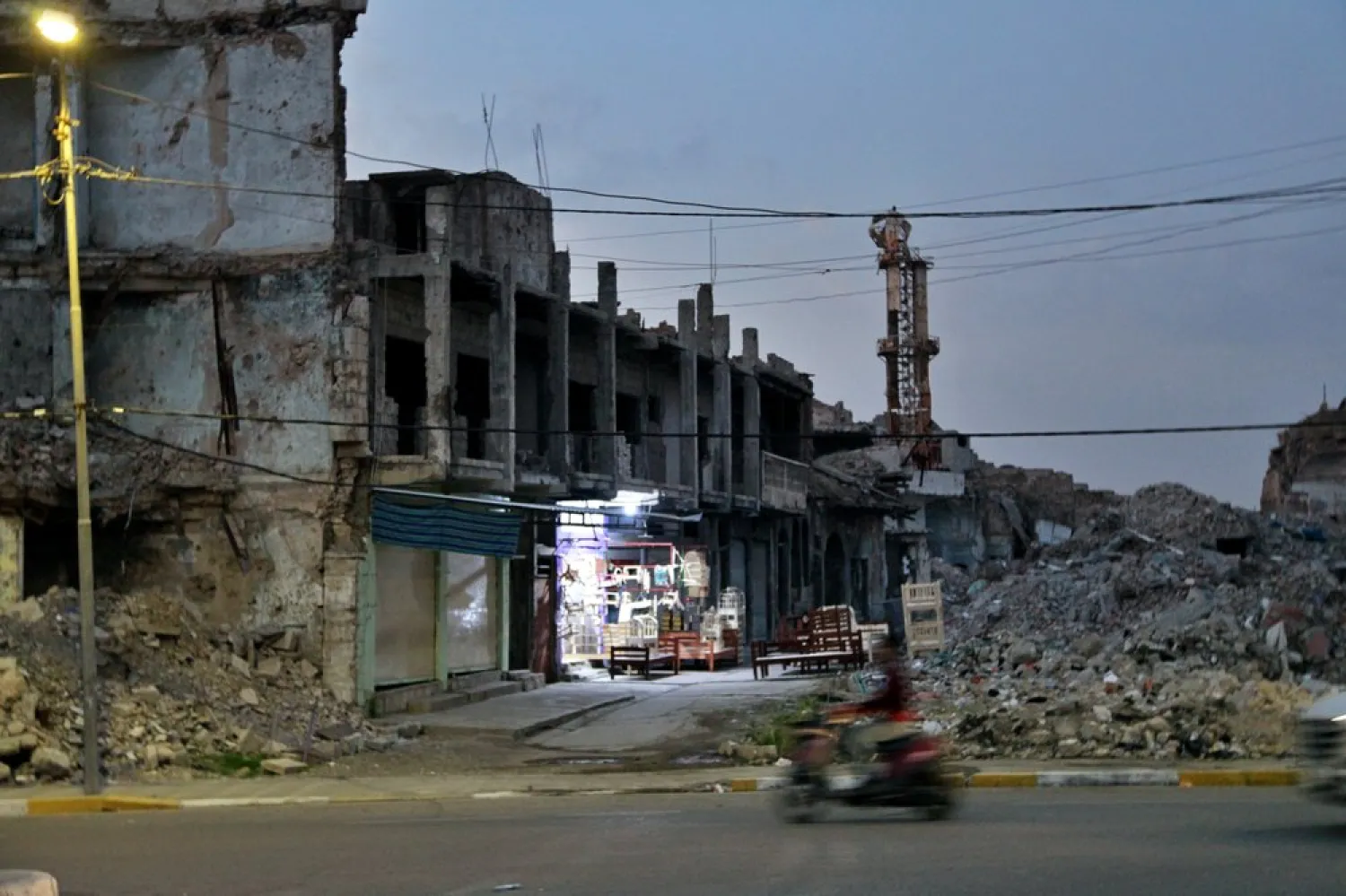Anan Yasoun rebuilt her home with yellow cement slabs amid the rubble of Mosul, a brightly colored manifestation of resilience in a city that for many remains synonymous with the ISIS group’s reign of terror.
In the three years since Iraqi forces, backed by a US-led coalition, liberated Mosul from the militants, Yasoun painstakingly saved money that her husband earned from carting vegetables in the city. They had just enough to restore the walls of their destroyed home; money for the floors was a gift from her dying father, the roof a loan that is still outstanding.
Yasoun didn’t even mind the bright yellow exterior — paint donated by a relative. “I just wanted a house,” said the 40-year-old mother of two.
The mounds of debris around her bear witness to the violence Iraq's second-largest city has endured. From Mosul, ISIS had proclaimed its so-called “caliphate” in 2014. Three years later, Iraqi forces backed by a US-led coalition liberated the city in a grueling battle that killed thousands and left Mosul in ruins.
Such resilience is apparent elsewhere in the city, at a time when Baghdad’s cash-strapped government fails to fund reconstruction efforts and ISIS is becoming more active across the disputed territories of northern Iraq.
Life is slowly coming back to Mosul these days: merchants are busy in their shops, local musicians again serenade small, enthralled crowds. At night, the city lights gleam as restaurant patrons spill out onto the streets.
The UN has estimated that over 8,000 Mosul homes were destroyed in intense airstrikes to root out ISIS. The nine-month operation left at least 9,000 dead, according to an AP investigation.
Memories of the group’s brutality still haunt locals, who remember a time when the city squares were used for the public beheading of those who dared violate the militants' rules.
The Old City on the west bank of the Tigris River, once the jewel of Mosul, remains in ruins even as newer parts of the city have seen a cautious recovery. The revival, the residents say, is mostly their own doing.
“I didn’t see a single dollar from the government,” said Ahmed Sarhan, who runs a family coffee business.
Antique coffee pots, called dallahs, line the entrance to his shop, which has been trading coffee for 120 years. An aging mortar and pestle, used by Sarhan’s forefathers to grind beans, sits in his office as evidence of his family’s storied past.
“After the liberation, it was complete chaos. No one had any money. The economy was zero,” he said. His business raked in a measly 50,000 Iraqi dinars a day, or around $40. Now, he makes closer to about $2,500.
But even as Sarhan and other merchants are starting to see profits — despite the impact of the coronavirus pandemic — ordinary laborers are struggling. Sarhan employs 28 workers, each getting about $8 a day.
“It is nothing ... they will never be able to rebuild their homes,” he says.
Since the ouster of ISIS in 2017, the task of rebuilding Mosul has been painfully slow. Delays have been caused by lack of coherent governance at the provincial level; the governor of Nineveh province, which includes Mosul, has been replaced three times since liberation.
With no central authority to coordinate, a tangled web of entities overseeing reconstruction work — from the local, provincial and federal government to international organizations and aid groups — has added to the chaos.
The government has made progress on larger infrastructure projects and restored basic services to the city, but much remains unfinished.
Funds earmarked for reconstruction by the World Bank were diverted to help the federal government fight the coronavirus as state coffers dwindled with plunging oil prices. Meanwhile, at least 16,000 Mosul residents appealed for government cash assistance to rebuild their homes.
Only 2,000 received financial assistance, said Zuhair al-Araji, the mayor of Mosul district.
“There’s no money,” he said. “They have to rebuild on their own.”
Mosul residents eye government policies with suspicion and suspect local officials are too corrupt to help them.
“Whatever funds are provided, they will steal it,” said Ammar Mouwfaq, who spent all his savings to re-open his soap shop in the city last year.
A photo of his father hangs inside the shop, which he took over in the 1970s. Neat stacks of the region's famous olive oil soap, imported from the Syrian city of Aleppo, tower above him.
“What you see now, I did alone,” he added.
On one thoroughfare the ruins of cinemas bombed by ISIS are a stark contrast to the shops and restaurants abuzz with customers.
The Old City, with its labyrinth of narrow streets dating back to the Middle Ages, now serves as an eerie museum of ISIS horrors. Misshapen iron rods jut out of what's left of houses they were designed to fortify. Smashed pieces of alabaster stone and masonry, once extolled by historians for architectural significance, lie among the debris. Signs of a former life — a pair of women's shoes, a notebook covered in hearts, shells from exploded ammunition — are untouched.
“Demolition is forbidden” reads a graffiti written on a slab of wall surrounded by rubble, a testament to Mosul’s unwavering dark humor.
The Mosul Museum, where ISIS militants filmed themselves smashing priceless antiquities to dust, partially re-opened in January. But apart from occasional contemporary art exhibits such as that of Iraqi sculptor Omer Qais last month, there is nothing to see.
On the other side of town, Sarhan, the coffee trader, invites anyone who cares to see his collection of antique swords, plates and bowls he painstakingly hunted down. In the 12th century, Mosul was an important hub for trade; a century later, its intricate metalwork rose to prominence.
“This is our history,” said Sarhan, holding up a rusting bronze plate, engraved with 1202, the year it was made.
“If I don’t protect it, who will?”
















